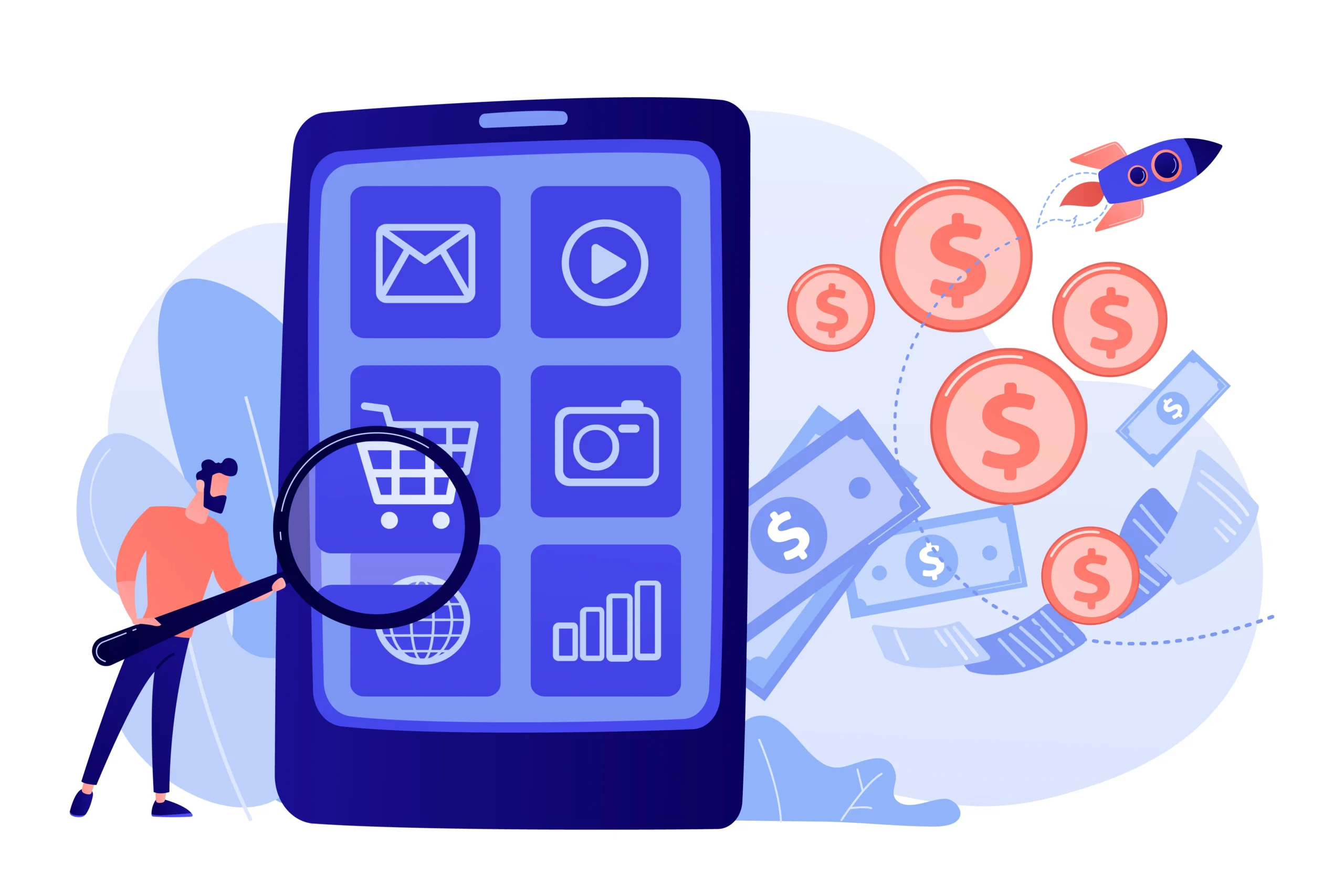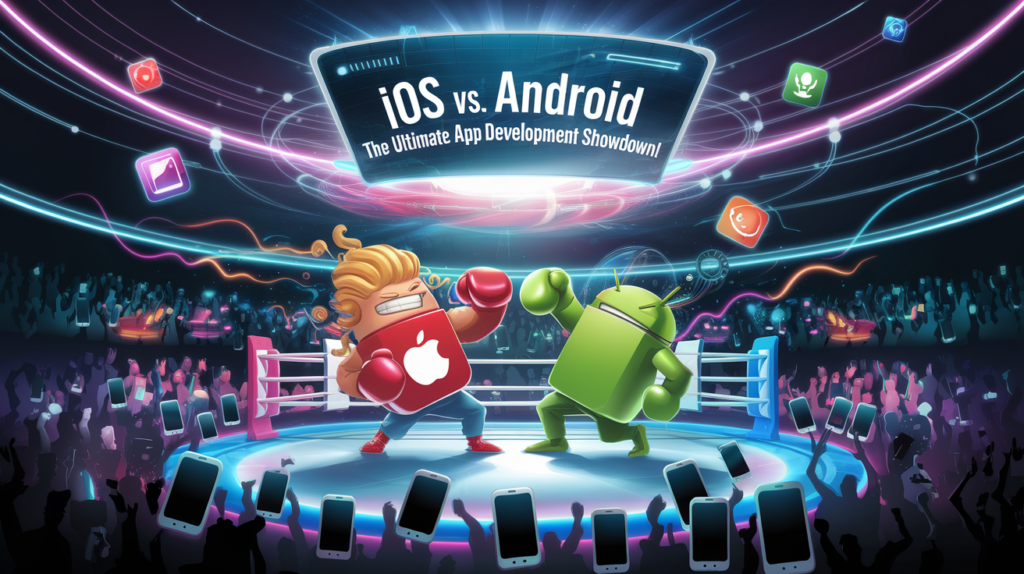“Arre bhai, iPhone ke liye app banayein ya Android ke liye?”—Every startup founder ever.
If you’re planning to build an app, this question has probably haunted you too. On one hand, iOS users spend more money. On the other, Android dominates the market share. So, what do you choose first?
Before you start panicking like an engineering student during exam season, let me tell you—there is no single “right” answer. But don’t worry, we’re here to help you figure out what’s best for your business, your audience, and your budget.
Let’s break down the battle of iOS &Android development and help you decide which one to build first!
Introduction: The Ultimate Showdown – iOS & Android Development
Imagine this: You’ve got a killer app idea. It’s as revolutionary as Zomato was when people still trusted restaurant reviews. Now comes the million-dollar question:
“Should I build for iOS first or Android?”
Picking the wrong platform could mean losing potential customers, wasting money, or even worse—your investor looking at you like “Yeh kya kar diya bhai?”
This blog by adwebcraft will help you make an informed (and stress-free) decision by comparing iOS & Android development across key factors like cost, market reach, development complexity, and revenue potential. Here’s a good blog for you if you want to know Native vs Hybrid vs PWA: Which App Development Approach is Best for 2025?
Understanding the Market: Who Uses What?
It’s really important to look after market share, when we are going to talk about iOS & Android Development
India’s Mobile OS Breakdown (as of recent stats):
-
Android – 77% market share (a.k.a. the common man’s OS)
-
iOS – 22% market share (a.k.a. rich cousins with iPhones)
Who Uses iOS?
-
Premium users – High-income groups, Apple fanboys, and people who pay for subscriptions without worrying about their UPI balance.
-
Countries dominated by iPhones – USA, Canada, UK, and rich parts of India like South Delhi or South Bombay.
-
More brand-loyal – iOS users don’t switch platforms as often as Android users.
Who Uses Android?
-
The masses – Students, budget-conscious users, and your dad, who’s still using his 4-year-old one.
-
More global reach – Popular in India, Southeast Asia, and Africa.
-
Variety of devices – From ₹7,000 phones to ₹1.5 lakh Samsung foldables.
Bottom Line:
If your target audience for iOS & Android Development is premium users, start with iOS. If you’re targeting mass adoption, go for Android first. But, by time passes, people have started switching to ios and iphone.
Development Complexity: Which One is Easier to Build?
iOS App Development:
- Swift language – Easier to learn and use.
- Limited devices – Only a few screen sizes to worry about.
- Strict App Store guidelines – Apple won’t let just any app in.
Android App Development:
- Java & Kotlin – More widely used, but takes longer to code.
- Flexible – You can customize the app more.
- Too many devices – You have to test for multiple resolutions, screen sizes, and Android versions.
Bottom Line: iOS apps are faster and easier to develop because of limited devices. Android apps take longer due to fragmentation.

App Development Cost: Where Will Your Money Go?
Developing an app is like shopping on Amazon during a sale—you always end up spending more than expected. So decision for iOS & Android Development must be precise.
iOS Development Costs More Because:
-
Apple developers charge higher rates.
-
App Store fees are ₹8,000/year vs. Google Play’s one-time ₹2,500 fee.
Android Development Can Get Expensive Because:
-
More testing is required across different devices.
-
You’ll need extra development time to make sure it runs smoothly everywhere.
Bottom Line: If you have limited budget, Android is cheaper. If you want a polished, premium app, go for iOS.
Time to Market: Which One Gets Your App Live Faster?
There are multiple things to keep in mind while iOS & Android Development. If you need your app live yesterday, go with iOS.
-
iOS apps take 3-4 months to develop.
-
Android apps can take 5-6 months due to testing on multiple devices.
Also, Apple’s approval process is slow. Google Play Store is more relaxed (even if it sometimes lets a “Free Netflix” scam app slip through).
Monetization Strategies: Who Pays More?
Here’s the deal—iPhone users spend more money on apps than Android users.
Revenue per User:
-
iOS users spend 2.5x more on in-app purchases.
-
Android users prefer free apps with ads.
Bottom Line: If your app relies on subscriptions or in-app purchases, go for iOS first. If your revenue model is ads, Android is better.
User Experience: Which Platform Feels Smoother?
When it comes to iOS & Android Development, user experience is a major factor that businesses can’t ignore. If your app doesn’t feel smooth, intuitive, and aesthetically pleasing, users will delete it faster than a spammy “Congratulations, you won an iPhone!” SMS.
iOS User Experience: The Apple Advantage
-
Apple follows strict Human Interface Guidelines (HIG), ensuring that every iOS app looks clean, consistent, and easy to navigate.
-
iOS apps have a uniform design language across all Apple devices, meaning users don’t have to “learn” how to use a new app.
-
Apple users expect a premium experience, and apps built for iOS often deliver a sleek, minimalist, and polished interface.
Android User Experience: The Power of Customization
-
Unlike Apple, Android allows more customization, meaning developers can create unique UI/UX designs.
-
Different Android brands (Samsung, OnePlus, Xiaomi) modify the OS, which sometimes leads to inconsistent user experiences.
-
Since Android has a vast variety of screen sizes, an app that looks good on one phone might look broken on another—so testing is crucial.
Which One Feels Smoother in iOS &Android Development?
-
If you want a highly polished, consistent, and premium feel, iOS is the winner.
-
If you want more creative control and customization, Android is your best bet.
But let’s be honest—whether iOS or Android, if your app lags like an old Nokia running a YouTube video, users won’t care which OS it’s on—they’ll just uninstall it.
Cross-Platform Development: Can You Have the Best of Both Worlds?
In the great battle of iOS & Android Development, sometimes the best answer is—”Why not both?”
Cross-platform development lets you build one app that works on both iOS and Android. It’s like making butter naan that tastes amazing with both dal makhani and butter chicken—efficient and delicious!
The Best Cross-Platform Development Tools
- Flutter (by Google) – Uses Dart programming language and creates stunning UI experiences.
- React Native (by Meta) – Uses JavaScript and allows easy integration with existing native apps.
- Xamarin (by Microsoft) – C#-based, good for enterprise applications.
Why Consider Cross-Platform Development?
- Faster development – One codebase for both platforms means you launch quicker.
- Lower costs – You don’t need two separate development teams for iOS and Android.
- Consistent experience – Users get a similar feel on both iOS and Android.
The Downside?
- Cross-platform apps may not be as optimized as native apps.
- Some advanced features (like ARKit on iOS) might not work as smoothly.
So, What’s the Verdict in iOS &Android Development?
If you’re a startup on a budget, cross-platform development is the perfect middle ground—it’s like getting an iPhone-quality app at an Android price.
Security & Updates: Who Keeps Your App Safer?
When it comes to iOS & Android Development, security is a serious matter. After all, no one wants their app turning into the next data breach headline on Twitter(X).
iOS Security: Apple’s Walled Garden
-
Apple has tight control over the App Store, meaning only high-quality, secure apps make it through.
-
End-to-end encryption in iOS ensures better privacy and security.
-
iOS updates roll out simultaneously to all devices, so users always have the latest security patches.
Android Security: More Open, More Risks
-
Since Android allows third-party app stores, it’s easier for malware to sneak in.
-
Security patches depend on phone manufacturers, meaning some devices might get updates months (or years) late.
-
However, Google Play Protect helps scan and remove harmful apps automatically.
Which One Wins the Security Battle in iOS & Android Development?
-
If your app deals with sensitive data (like banking or healthcare), iOS is the better choice.
-
If you’re building a more general-purpose app, Android is secure enough—but make sure you follow best security practices.
Let’s be real—whether iOS or Android, if your password is still “123456,” no OS can save you.
App Store vs. Google Play: Where’s the Real Battle?
For iOS & Android Development, The App Store and Google Play are like Mumbai vs. Delhi street food—both serve great things, but in very different ways.
| Feature | Apple App Store | Google Play Store |
|---|---|---|
| Approval Time | 3-7 days (strict) | 24-48 hours (flexible) |
| App Quality | High (strict checks) | Variable (easy approvals) |
| Fees | ₹8,000/year | ₹2,500 one-time |
| App Discovery | Harder (competitive) | Easier (algorithm-based) |
Why Choose the App Store in iOS & Android Development?
-
Higher trust and quality.
-
More premium users who are willing to pay.
Why Choose Google Play in iOS & Android Development?
-
Faster approval process (less headache).
-
Wider audience with more downloads.
Let’s be honest, though—if your app is a disaster, neither store will save it.

App Development for Startups: Where Should You Begin?
If you’re a startup, choosing between iOS & Android Development is as stressful as choosing between Chai and Coffee before a long workday.
When to Choose iOS First:
- If you want early revenue from subscriptions or in-app purchases.
- If your audience is premium users (USA, Europe, India’s elite class).
- If you want faster development with fewer devices to test.
When to Choose Android First:
- If your goal is mass adoption (especially in India, SE Asia, Africa).
- If your business relies on advertisements instead of in-app purchases.
- If you need more flexibility and customization in the app.
Or Just Go Cross-Platform?
If you can’t decide, use Flutter or React Native and get both iOS and Android in one shot. iOS & Android Development solved.!
The best approach? Start with iOS if you need revenue first, Android if you need users first, and both if you want balance.
And if all this still sounds confusing, just hire an expert team like adwebcraft to make the decision for you! 🚀
How Adwebcraft Helps Businesses with Mobile App Development
At adwebcraft, we don’t just build apps—we craft digital experiences that drive results. Whether you’re still debating between iOS & Android development, or you already know what you need, our expert team ensures that you make the right choice.
Why Choose adwebcraft?
- Custom iOS App Development – For businesses that want premium, high-end apps with seamless performance.
- Android App Development – For brands targeting mass adoption, affordability, and flexibility.
- Cross-Platform Development – If you want to eliminate the iOS & Android development dilemma and reach both audiences with a single codebase.
- Scalability & Performance Optimization – We don’t just launch apps—we optimize them for growth, ensuring long-term success.
Ready to Launch? Let’s Build Something Amazing!
If you’re still wondering whether iOS & Android development is the right starting point, let adwebcraft guide you. Contact us today, and let’s create an app that sets your brand apart!
Conclusion: So, Which One Should You Build First?
The great iOS & Android development debate doesn’t have a single winner—it depends on your business goals. Let’s break it down once again:
Go iOS First If:
- Your target audience consists of premium, high-spending users.
- You want faster app development and a controlled ecosystem.
- You’re planning to monetize through subscriptions and in-app purchases.
- You’re launching in markets like the USA, UK, or premium urban areas in India.
Go Android First If:
- You’re targeting mass-market adoption, especially in India.
- Your app relies on ads or wide accessibility.
- You need a budget-friendly development approach.
- You want to reach users in developing regions where Android dominates.
Or Just Build Both!
If you don’t want to choose, opt for cross-platform development using Flutter or React Native. This way, you get the best of both worlds, reducing iOS & Android development conflicts.
Remember, launching an app is a marathon, not a sprint—choosing the right platform is just the first step


